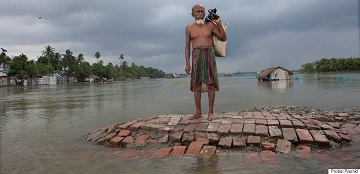Monday 6 August 2018 1:04pm
PhD Candidate
Supervisors
Dr Caroline Orchiston (Centre for Sustainability)
Advisors
Dr Douglas Hill (School of Geography) and Dr Ashraful Alam (School of Geography)
Project dates
2018-2021
Abstract
 Climate-driven hazards are occurring more frequently in recent years around the world and have multifaceted impacts on the people and their surroundings. The adverse effects of different climatic perils make peoples' livelihoods more vulnerable and sometimes force them to leave their own living. Every year a significant number of people are displacing around the globe due to different climatic disasters who are identified as climate (-induced) migrants and the process of their migration is termed as climate (-induced) migration. Climate migration occurs mostly internally and sometimes across borders. It changes peoples' way of living with a lot of uncertainties and insecurities. Thus, securing livelihoods is a key concern for these displaced people in their new destinations. Their integration into a new destination is not an easy process if the host communities are not welcoming. Therefore, this study aims to understand the dilemma between climate-displaced people and host communities in their intersections. More specifically, this study will investigate the livelihoods opportunities and challenges of climate migrants focusing their socio-economic and cultural rights in New Zealand. It will also assess the social impacts of climate migration on the host communities. Moreover, this study will explore how the existing policies and initiatives by New Zealand government address climate migration issue considering both displaced and host communities. It will conclude by suggesting a sustainable livelihoods framework for climate migrants in their international destination.
Climate-driven hazards are occurring more frequently in recent years around the world and have multifaceted impacts on the people and their surroundings. The adverse effects of different climatic perils make peoples' livelihoods more vulnerable and sometimes force them to leave their own living. Every year a significant number of people are displacing around the globe due to different climatic disasters who are identified as climate (-induced) migrants and the process of their migration is termed as climate (-induced) migration. Climate migration occurs mostly internally and sometimes across borders. It changes peoples' way of living with a lot of uncertainties and insecurities. Thus, securing livelihoods is a key concern for these displaced people in their new destinations. Their integration into a new destination is not an easy process if the host communities are not welcoming. Therefore, this study aims to understand the dilemma between climate-displaced people and host communities in their intersections. More specifically, this study will investigate the livelihoods opportunities and challenges of climate migrants focusing their socio-economic and cultural rights in New Zealand. It will also assess the social impacts of climate migration on the host communities. Moreover, this study will explore how the existing policies and initiatives by New Zealand government address climate migration issue considering both displaced and host communities. It will conclude by suggesting a sustainable livelihoods framework for climate migrants in their international destination.
Photo: A climate-induced migrant in Bangladesh (Photographer: Probal Rashid)
